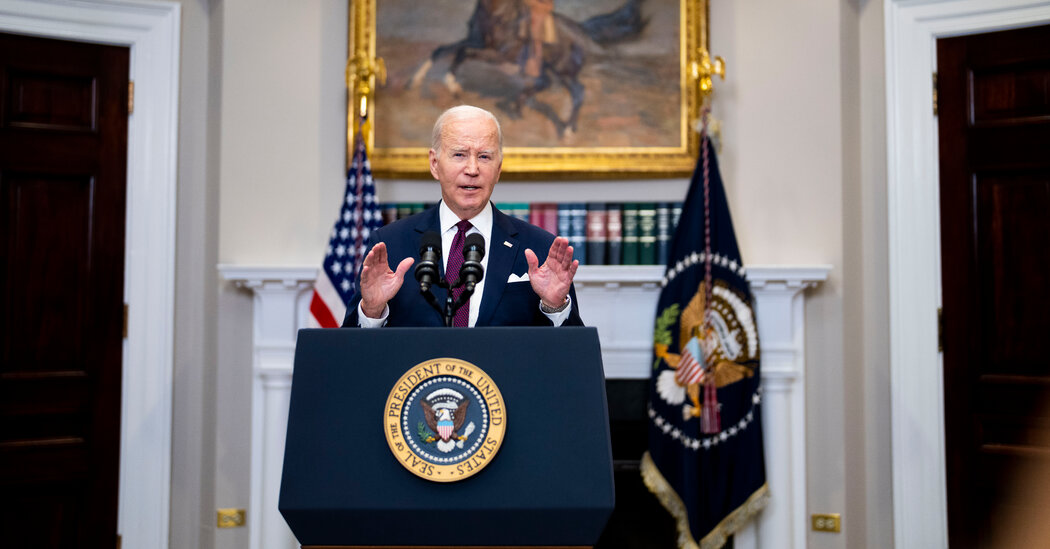A Louisiana federal court on Tuesday banned parts of the Biden administration from communicating with social media platforms about large amounts of online content, a ruling that could curtail efforts to combat false and misleading narratives about the coronavirus pandemic and other issues.
In the ruling, Judge Terry A. Doughty of the U.S. District Court for the Western District of Louisiana said parts of the government, including the Department of Health and Human Services and the Federal Bureau of Investigation, could not talk to social media companies for “the purpose to urge, encourage, pressure or induce in any way the removal, removal, suppression or reduction of content containing protected freedom of expression.”
Judge Doughty, in issuing a preliminary injunction, said the agencies could not flag specific posts to the social media platforms or request reports on their efforts to remove content. The ruling says the government can still notify the platforms of reports of crimes, threats to national security or foreign attempts to influence elections.
The ruling, which could have significant First Amendment implications, was a major development in a fierce legal battle over the boundaries and limits of expression online.
Republicans accuse the government of improperly collaborating with social media sites such as Facebook, Twitter and YouTube to censor critics, saying the platforms are disproportionately removing right-wing content. Democrats say the platforms have failed to adequately monitor disinformation and hate speech, leading to dangerous outcomes, including violence.
Courts are increasingly being forced to weigh in on the issue — with the potential to upend decades of legal norms that have governed online speech.
The Republican attorneys general of Texas and Florida are defending groundbreaking state laws that prohibit internet platforms from taking down certain political content, and legal experts believe those cases will eventually reach the Supreme Court. The Supreme Court earlier this year refused to limit a law that allows the platforms to avoid legal liability for content users post on the sites.
Tuesday’s ruling, in a lawsuit filed by the attorneys general of Louisiana and Missouri, is likely to be appealed by the administration, but its impact could be sweeping, forcing state officials, including law enforcement, to decline from reporting the platforms of inconvenient content.
Government officials have argued that they do not have the authority to have posts or entire accounts removed, but they have long partnered with Big Tech to take action against illegal or harmful material, especially in cases involving child sexual abuse, human trafficking and other criminal activities. That included regular meetings to exchange information about the Islamic State and other terrorist groups.
The White House did not immediately comment. Meta, which owns Facebook and Instagram, declined to comment. Twitter had no comment and Google did not respond to a request for comment.
Senator Eric Schmitt, Republican of Missouri and formerly the state’s attorney general, said on Twitter that the ruling was a “victory for the First Amendment on this Independence Day.”
The issue of government influence over social media has become increasingly partisan.
The Republican majority in the House has taken up the case, smothering universities and think tanks that have studied the issue with heavy requests for information and subpoenas.
Since taking over Twitter last year, Elon Musk has advanced a similar argument, releasing internal company documents to select journalists suggesting what they believe was collusion between the company and government officials. While that is far from proven, some of the documents Mr. Musk disclosed made it into the arguments of the lawsuit.
The defendants, the social media companies and experts who study disinformation have argued that there is no evidence of a systematic attempt by the government to censor individuals in violation of the First Amendment.
At the same time, emails and text messages made public in the case ruled by Judge Doughty have shown instances where officials complained to social media executives when influential users spread disinformation, especially regarding the coronavirus pandemic.
The ruling came in a lawsuit filed last year by the attorneys general of Missouri and Louisiana, both Republicans, and four other individual plaintiffs: Jayanta Bhattacharya and Martin Kulldorff, epidemiologists who question the government’s handling of the pandemic; Aaron Kheriaty, a professor fired from the University of California, Irvine, for refusing to get vaccinated against the coronavirus; Jill Hines, a director of Health Freedom Louisiana, an organization that has been accused of disinformation; and Jim Hoft, founder of Gateway Pundit, a right-wing news site.
While the lawsuit named President Biden and dozens of officials from 11 government agencies as defendants, some of the cited cases took place during the Trump administration.
Judge Doughty, who was appointed to the Western District by President Donald J. Trump in 2017, has made the court a sympathetic place for conservative cases after previously blocking the Biden administration’s national vaccination mandate for healthcare workers and banning new federal leases for oil and gas drilling.
He allowed prosecutors extensive discovery and statements from prominent officials such as Anthony S. Fauci, then the nation’s top infectious disease expert, who told plaintiffs’ attorneys that he was not involved in discussions to censor online content.
Judge Doughty expressed skepticism about that argument in March when he denied a motion to dismiss the case.

